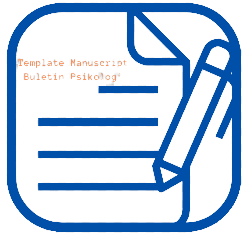Hubungan Sistem Kepercayaan Dan Strategi Menyelesaikan Masalah Pada Korban Bencana Gempa Bumi
Amitya Kumara(1*), Yuli Fajar Susetyo(2)
(1)
(2)
(*) Corresponding Author
Abstract
The objectives of this research were to know how people in Yogyakarta defined the past earthquake that stroked them through
their religion or faith point of view, and how it could affect their copying strategy in facing the condition after disaster. The data
were collected using Religion/Faith Scale, Copying Strategy Scale, and interview. The respondents were taken from the victims of
earthquake in County of Sleman and Bantul footed up to 80 people. The data‐analysis collected would be processed both qualita‐
tively and quantitatively. On every stages of post‐disaster condi‐
tion had developed different copying strategy among the victims. Emerge process of copying depended on the pressure condition
(casuistic) and religion system that the victims believed. With the result, religion system had a very important role in affecting
the copying strategy. Relation between faith and copying strategy for every victim didn’t work linear in facing situation and condition
after the disaster, but made a circle. Started from a normal condition, then the disaster stroked, changed their behavioral patterns in facing problems that different from the normal one, resulting the copying behavior. The emerge of copying was varies, unique, and very casuistic. The form of copying that mostly appears based on discussion and the result of both quantitative and qualitative researches is Palliative that formed upon internal beliefs. Generally, the meaning of disaster for respondents related to Divinity as the founation for their beliefs. They defined disaster as fate from God that they had to experience. They had to accept it positively, by took the wisdom from disaster so they could get closer with God.
Full Text:
PDF (Bahasa Indonesia)Article Metrics
Refbacks
- There are currently no refbacks.
Copyright (c) 2015 Jurnal Psikologi
 Jurnal Psikologi (jpsi) is licensed under a Creative Commons Attribution-ShareAlike 4.0 International License.
Jurnal Psikologi (jpsi) is licensed under a Creative Commons Attribution-ShareAlike 4.0 International License.





